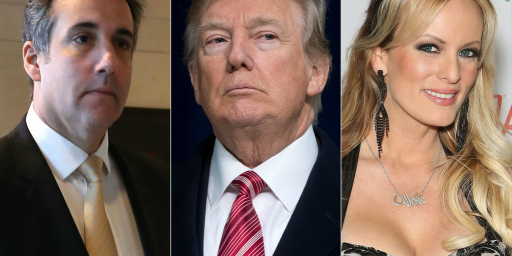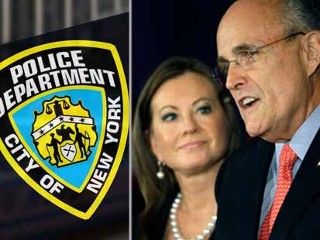Why Bernard Kerik is Qualified
Matt Yglesias thinks Bernard Kerik was a poor choice to lead Homeland Security:
It’s hardly a surprise, but once again Bush has missed an opportunity to do some political reaching out that would have been beneficial to the country and entailed little cost to conservatism.
*** The ideal fix would have been to fill the job with a Democrat — someone people on the other side would trust not to be manipulating the system. Since the other issues the DHS covers are far from the core ideological dispute, it would be easy enough to find a qualified Democrat who agreed with the president’s views on these topics. Thus, a credible, competent manager could, in a small but important way, help advance US counterterrorism policy.
Instead, Bush chose to take someone with no relevant qualifications who’s campaigned for him as president and who brings back memories of 9-11, Bush’s greatest moment of political popularity. It’s all-too-typical.
While I agree that appointing a moderate Democrat–I’ve suggested Joe Lieberman and Joe Biden–would have been an inspired choice as well, Kerik is imminently qualified for the job.
Phil Carter explains why in an excellent piece in Slate, “All Homeland Security Is Local – Which is why Bernard Kerik is the right choice to lead the department. ”
Kerik’s qualifications to run DHS exceed those of outgoing Secretary Tom Ridge, or those of other counterterrorism experts who have worked in the White House like Richard Clarke and Rand Beers. That’s because at its core, homeland security is a local business, not a federal one. Kerik understands this. Thanks to his career as a cop, he knows what police agencies and others on the front lines of homeland security really need from their federal government to do their jobs.
The secretary of Homeland Security wears two main hats. In his day job, he runs the third-largest federal agency, comprising 180,000 employees and what used to be 22 separate agencies ranging from the Coast Guard to the Secret Service. In this role, Kerik must learn to act as chief executive, something he did passably as New York City police commissioner, and poorly as Iraq’s interim interior minister. It is the second job of the DHS chief that Kerik is prepared for: national homeland security czar. Under the DHS’s enabling statute, the secretary serves as the president’s chief adviser and the nation’s lead official on homeland security. DHS sets national policy on everything from the threat level (the infamous DHS color chart) to container inspections at U.S. ports and pushes programs at the state and local level, such as chemical and biological defense training for first responders.
*** Kerik knows that the most likely person to stop or encounter a terrorist attack is not an FBI agent or CIA analyst, but a cop walking the beat or a transit worker who sees something suspicious. If Kerik remains true to his background, he will direct the lion’s share of resources and federal attention toward these local officials on the front lines of homeland security.
Quite right. Further, as former New York Mayor Rudolph Giuliani told Newsday, Kerik is much more skilled as an administrator than he’s often given credit for.
Giuliani, who surprised many by choosing Kerik to become the city’s 40th police commissioner, said he always saw much more than a beefy cop with a knack for catching drug dealers. “When you see him, he’s a big strong guy and a black belt,” said Giuliani. “What you get to know when you work with him is how smart he is … how effective and sophisticated a manager he is.” As proof, Giuliani cited Kerik’s success in drastically reducing violence in city jails in the late 1990s as head of the Department of Correction, creating a statistics-based performance review program called TEAMS, fashioned after a similar technique then being used to great success by NYPD brass.
Lieberman or Biden would be excellent choices for the National Intelligence Director position once Congress hammers out the intelligence reform bill. Indeed, they’re both more qualified for that job than they would have been for DHS.
Update (12/4): Matt responds here. He’s intrigued by Phil’s argument but counters:
Bush hasn’t historically let cabinet secretaries besides Don Rumsfeld act as real policymakers. Instead they’ve been administrators of the agencies they oversee and public spokespeople for Bush’s policies.
Of course, if that’s true, then Kerik’s qualifications are hardly at issue. I agree that Bush expects his policy team to stay on his game plan, which seems reasonable given that he’s the one who was elected. As Slate’s David Greenberg recently noted, this is hardly new. Aside from the obvious case of Colin Powell, though, Bush has mostly picked people who share his basic vision for important posts. Christine Todd Whitman at EPA is the only other possible exception that comes to mind.





So… Yglesias thinks the only right answer is for Bush to appoint members if the Democrat party…
Is Generalissimo Francisco Franco still dead?
Every time a Republican is elected, the liberals whine that said Republican should resign all power to a Democrat. After a while it just sounds stupid.
Come to think of it, it sounded stupid the first time.
If the Dems want to have power, perhaps they should do this little thing called “winning elections.”
Note to Matt:
“The ideal fix would have been to fill the job with a Democrat — someone people on the other side would trust not to be manipulating the system.”
If the people trusted Democrats they would have voted for them.
A real cop taking over a law enforcement job? Brilliant choice.
Yglesias is saying no Republicans can be trusted. I strongly disagree and remind him of which party won the election. There is no reason to be bi-partisan in a choice like this.
Problem is is that the only arguable Dems that would be qualified (Lieberman/Biden)–would have to give up their senate seats–and it’s unlikely any sitting Dem would be willing to do that.
“As proof, Giuliani cited Kerik’s success in drastically reducing violence in city jails in the late 1990s as head of the Department of Correction, creating a statistics-based performance review program called TEAMS, fashioned after a similar technique then being used to great success by NYPD brass.”
Oh, the guy cut down violence in the jails–this is what Guliani suggests is evidence of his administrative acumen?!?!?!
James, in Phil Carter’s piece, which you term, “excellent,” he gives this less-than-enthusiastic assessment: “In this role, Kerik must learn to act as chief executive, something he did passably as New York City police commissioner, and poorly as Iraq’s interim interior minister.”
The important thing to understand about any large sprawling, federal bureaucracy is that the “chief executive” or “administrative” skills are the most essential.
This Kerik character has a pretty poor-to-mediocre record in this regard. The guy has no business directing such an important bureaucracy.
This is clearly a patronage job–Bush is clearly trusting the security of the US to a guy who is simply a willing part of his machine.
This is deplorable.
The actions of the Bush administration have made it pretty clear that homeland security is not a priority. It has been underfunded and poorly administrated from the start. The priority has been Iraq, Iraq, Iraq. America’s security? Like bin laden, its not really a concern…
I also find it strange that Rudy Giuliani refused his country’s call during wartime. This must be some form of patriotisim that I am not familiar with…